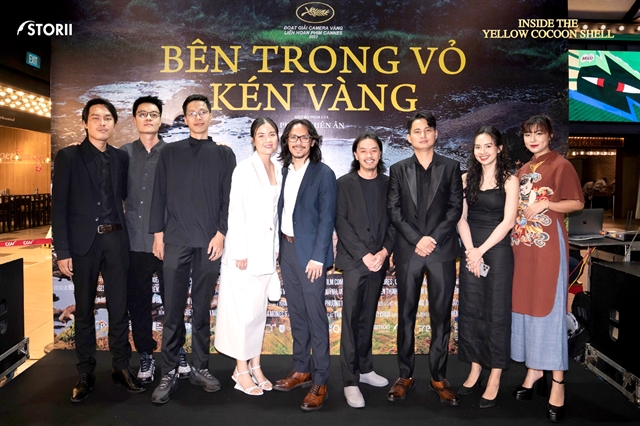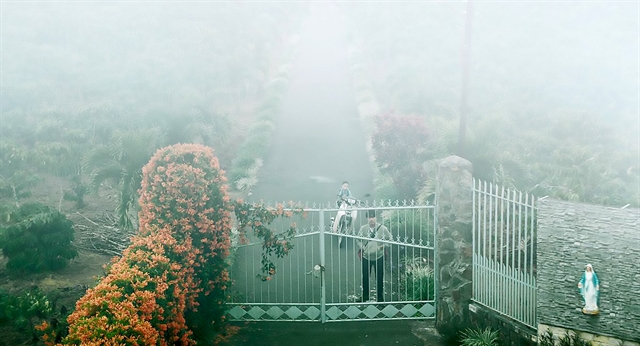HA NOI - Three months after winning the Camera D'or award for the first feature film at Cannes Film Festival, director Phạm Thiên Ân and his crew debuted the movie in their homeland.
Bên Trong Vỏ Kén Vàng (Inside the Yellow Cocoon Shell) received good reviews from Vietnamese critics and on social media.

The film crew at the premiere of Inside the Yellow Cocoon Shell in Việt Nam. Photo courtesy of Storii.
“Minimalist but subtle, natural but refined, realistic but transcendent, Ân has shown the top talents of a film director in the genre of slow cinema, poetic cinema, and meditative cinema,” journalist and film critic Lê Hồng Lâm wrote on Vietcetara.
In the opening scene, which is comparable to the filmmaker's previous shot in 2019 Hãy Tỉnh Thức và Sẵn Sàng (Stay Awake, Be Ready), a roadside accident at a street corner interrupts a conversation between three friends enjoying dinner in a beer restaurant. Yet, Inside the Yellow Cocoon Shell goes beyond the pointless conversation during drinking as in Stay Awake, Be Ready to examine a man's unfulfilling life.
Inside the Yellow Cocoon Shell tell a story about Thiện, who is working as a wedding videographer in HCM City. After Hạnh, his sister-in-law is tragically killed in a motorcycle accident, Thiện returns her back to his former countryside hometown with his nephew, Đạo, who miraculously survived the crash. Thiện then starts looking for his older brother, Tâm, who disappeared years ago.
The film has a simple plot, however, Ân's cinematic language implies more than those.
Amid the magnificent landscapes and mystical fog of Bảo Lộc city, Lâm Đồng, the journey of Thiện takes us far from a usual geographical ride - it is a journey through the domains of mind concerning past and present lifetime, reality and dream, to find his “Tâm” (tâm means soul in Vietnamese).

Most of the scenes were filmed in Bảo Lộc City, Lâm Đồng province in the Central Highlands region of Việt Nam.
Director Ân creates a fantasy cinematic space, where he and the DOP Đinh Duy Hưng enrapture the audience with long-held shots, one that even lasts up to half an hour. The audience forgets the presence of the camera and accompanies the character to become a part of that slow atmosphere.
The image of the golden cocoon shell as well as the scene of the white butterflies in the dream-like forest reminds the audience of Chuang Tzu's philosophical question of who we are: "Was I - Chuang Tzu - dreaming that I was a butterfly or am I really a butterfly dreaming that I am Chuang Tzu?"
Whether you believed in a higher power or not, the oneiric film softly prompts us to ask questions about what we are here for, and how to escape the routine rhythm that society bounds us in.
“I do not force the audience to believe in any meaning. At the end of the film, each person will have a different experience based on the connection between themselves and the character,” Ân said.
The film still has non-perfect points: the slowness and length can be a challenge for the audience, as well as the unnatural dialogue. As Inside the Yellow Cocoon Shell is an arthouse production, it is predictable that the film does not appeal to the tastes of the mass audience.
According to boxofficevietnam.com, ten days after its premiere in Việt Nam, the box office performance slowed behind other commercial films when it only gained more than one billion đồng.
Yet, cinephiles have given the film mostly thumbs-up because they have seen the dedication of the non-professional crew with a low budget to present quality work.
The success of the film combines the versatility and essence of two features: earlier generation of directors that influence Ân such as Bela Tarr, Theo Angelopoulos, Kenji Mizoguchi, Tsai Ming-Liang, and Bi Gan, and his own originality of cinematic language.
“The film is a godsend and it has a life of its own. Our team tries to refresh to the beginning, and move on to the next project," Ân shared.
Inside the Yellow Cocoon Shell is shown at cinemas in Việt Nam until August 24 and will be released in France on September 13. VNS
OVietnam